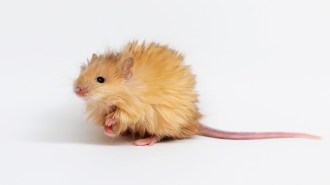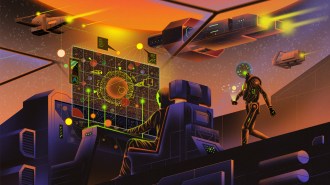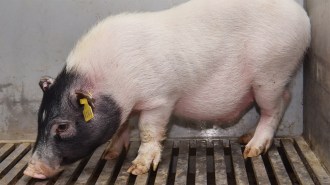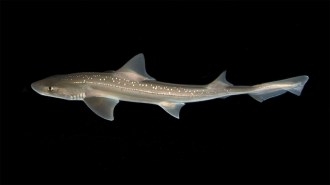All Stories
-
 Earth
Earth3 things to know about the deadly Myanmar earthquake
The magnitude 7.7 earthquake was powerful, shallow and in a heavily populated region with vulnerable buildings.
-
 Genetics
Genetics‘Woolly mice’ were just a start. De-extinction still faces many hurdles
Scientists created transgenic mice with woolly mammoth–like traits. But does it really bring us closer to bringing back woolly mammoths?
By Jason Bittel -
 Space
Space‘Star Wars’ holds clues to making speedier spacecraft in the real world
Controlled fusion, solar sails or ion engines could someday help spaceships travel between star systems.
-
 Quantum Physics
Quantum PhysicsPhysicists are mostly unconvinced by Microsoft’s new topological quantum chip
Majorana qubits could be error resistant. But after a contentious talk at the Global Physics Summit, scientists aren’t convinced Microsoft has them.
-
 Microbes
MicrobesElite athletes’ poop may hold clues to boosting metabolism
In a small study, mice given fecal transplants from elite cyclists and soccer players had higher levels of glycogen, a key energy source.
By Alex Viveros -
 Physics
PhysicsCalls to restart nuclear weapons tests stir dismay and debate among scientists
Many scientists say “subcritical” experiments and computer simulations make nuclear weapons testing unnecessary.
-
 Health & Medicine
Health & MedicineSurgeons transplanted a pig’s liver into a human
A genetically modified mini pig’s liver was able to function in the body of a brain-dead patient throughout a 10-day experiment.
By Meghan Rosen -
 Space
SpaceJWST spots the earliest sign yet of a distant galaxy reshaping its cosmic environs
The galaxy, called JADES-GS-z13-1, marks the earliest sign yet spotted of the era of cosmic reionization at 330 million years after the Big Bang.
-
 Genetics
GeneticsWhat 23andMe’s bankruptcy means for your genetic data
As 23andMe prepares to be sold, Science News spoke with two experts about what’s at stake and whether consumers should delete their genetic data.
-
 Animals
AnimalsYou might be reading your dog’s moods wrong
A dog's physical cues often take a back seat to environmental ones, skewing humans' perceptions, a small study suggests.
-

Math puzzle: The Lesser Fool
Solve the math puzzle from our April 2025 issue. In honor of April Fools’ Day, we offer the puzzling case of the Lesser Fool.
By Ben Orlin -
 Animals
AnimalsIs that shark ticking? In a first, a shark is recorded making noise
The ocean can be a symphony of fish grunts, hums and growls. Now add tooth-clacking sharks to the score.
By Susan Milius